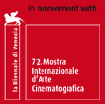|
2016:13thedition
august 31 september 10 |
|
03/09/2016
The first female auteur to take the stage was Crystal Moselle, director of That One Day, the second of the two shorts this year in the Miu Miu Women's Tales collection and the twelfth in the entire series; it screened on Thursday at the sala Perla. Aska Matsumiya, who composed the music for the film, was on stage for the occasion.
PHOTOGALLERY HIGH RES


Women against Stereotypes
by Francesca Fattorini
The first two talks in the Miu Miu Women's Tales 2016 series were held on Friday at the Italian Pavilion in the Hotel Excelsior, both moderated by journalist Penny Martin.
The first female auteur to take the stage was Crystal Moselle, director of That One Day, the second of the two shorts this year in the Miu Miu Women's Tales collection and the twelfth in the entire series; it screened on Thursday at the sala Perla. Aska Matsumiya, who composed the music for the film, was on stage for the occasion.
Despite the casual atmosphere, the talk touched on issues such as solidarity between women and the paucity of women filmmakers today.
Moselle started out by expressing her appreciation of the Miu Miu Women's Tales project: "I like the idea of women solidarizing with each other instead of indulging in backbiting at each other's expense. This really needs to be stressed."
This solidarity, apart from being one of the themes of the short film, also seemed to emerge from some of the anecdotes the director shared during the conversation. For example, when she described her working relationship with Matasumiya: "Our collaboration was splendid. Once when we met up and one of us was stirring the spoon in the teacup, it made the most marvelous sound."
Apropos of music, Matsumiya said she considered it a vehicle for communication, one that could even clarify the characters' points of view: "Guitar is perfect for skateboarding and it didn't have to produce a polished sound."
As announced, the issue of gender, a hot-button topic in contemporary society, was also on the agenda, and Friday morning's speakers repeatedly stressed that no distinctions whatsoever should be made between men and women: "As an artist, I have to say that gender doesn't matter. I never felt the need to work with women only; all you need is a good team. That said, however, women directors are still a minority today."
The Friday afternoon talk centered on Dakota Fanning and Juno Temple, two of Hollywood's enfants prodiges. Once again, the debate hinged on gender and the refusal to create a distinction between the sexes.
The idea re-emerged in Fanning's answer to a question as to whether she had ever worked with female filmmakers. "The goal is not to create a distinction," she replied, "but to work with good directors. Everyone has his or her own personality, and it's important not to compare them."
What came out of the two talks is women's desire to don a different guise: that is, to use their film narratives to create portraits of a woman's world that depart from the canons so dear to contemporary society.
Matsumiya had said as much at the morning session: "The person who has inspired me the most is Yoko Ono, not just because she's Japanese, but because she toppled the stereotype of the Asian woman, supposedly modest, keeping her opinions to herself. I have always been non-conformist, from a young age."
While in the afternoon, Juno Temple had this to say: "The roles for actresses should possibly be different from that of the usual girl next door."
Fortunately, concluded Penny Martin as she wrapped up the two talks: "Lately journalists have tended to focus more on women's essence than their appearances."
PHOTOGALLERY HIGH RES
© Associazione Culturale Giornate degli Autori - Via Santa Croce in
Gerusalemme 107 (RM) - P.IVA 08079171008 - Licenza S.I.A.E. 4858/I/4524
TRASPARENZA - Informativa sull'utilizzo dei cookie - Informativa sulla privacy
Design: EU-GENIA srl - Webmaster: Daniele Sorrentino
TRASPARENZA - Informativa sull'utilizzo dei cookie - Informativa sulla privacy
Design: EU-GENIA srl - Webmaster: Daniele Sorrentino








